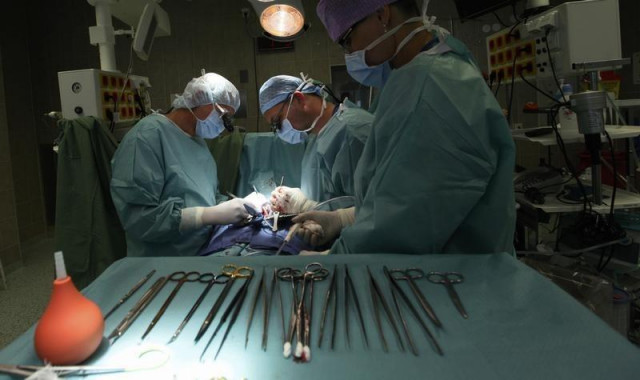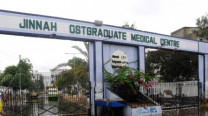Pakistan lagging behind in laparoscopic surgery
Tabba Kidney Institute hosts international masterclass to train doctors in procedure

Representational image. PHOTO: REUTERS
This was stated by Tabba Kidney Institute Urology Department Head and Surgeries Director Dr Sherjeel Saulat during an international masterclass in laparoscopic urology tilted, 'Nuts and Bolts', at the Tabba Kidney Institute.
As many as 100 laparoscopic surgeries have been performed in the last eight months since it was first introduced in Pakistan. The beneficiaries of the new type of surgery are 40 kids and 60 adults. The participants of the two-day workshop were informed that laparoscopic surgery uses minimal incisions unlike open surgery.
According to Dr Saulat, temperature, non-availability of clean drinking water and malnutrition are the reasons for kidney stone diseases in Pakistan.
Chief Operating Officer Dr Aqeel Ahmed said that the institute will soon launch robotic surgery. "The institute has brought major change in paediatric urology," he said, adding that it has introduced 3D laparoscopic urological surgeries in Pakistan in the presence of international trainers.
Life changing procedures: PIMS surgeons learn metabolic surgery
Dr Kamran Ahmed, while explaining the advantages, said that laparoscopic is a minimal invasive surgery in which a one centimetre incision is made with aid of a 3D camera. The surgery brings early recovery, less pain and less chances of infection.
"The patient benefits as their stay at the hospital is reduced and hence, the overall cost is reduced," Dr Ahmed said.
The master trainers helped junior consultants at a workshop where 32 doctors from all over Pakistan were shown 3D screening of surgeries on a large screen where international experts from China, Europe and Pakistani doctors working in foreign countries performed surgeries.
The masterclass consisted of multiple learning platforms, including setting up a laparoscopic operating room, hands on training and biochemical tissue in dry lab setting and hands-on stimulation for common procedures.



















COMMENTS
Comments are moderated and generally will be posted if they are on-topic and not abusive.
For more information, please see our Comments FAQ